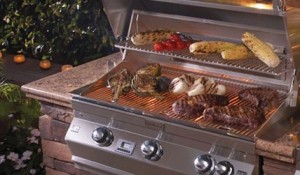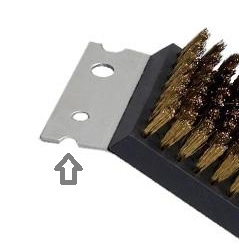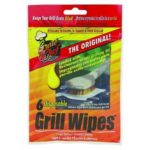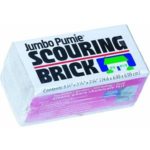Keep That Grill Clean
 There are people who have enough discipline to clean their grills immediately after using them, while the grill is still hot and whatever has stuck to or dripped upon the grill is easily removable. These people are lacking in social skills, probably, or are way too preoccupied with cleanliness. The rest of us are inside, eating with friends and relaxing in social splendor. The first group probably doesn’t need to read farther. This message is about ex post facto grill cleaning. This is possibly done later that day, but more likely days or weeks later, immediately before the next cookout.
There are people who have enough discipline to clean their grills immediately after using them, while the grill is still hot and whatever has stuck to or dripped upon the grill is easily removable. These people are lacking in social skills, probably, or are way too preoccupied with cleanliness. The rest of us are inside, eating with friends and relaxing in social splendor. The first group probably doesn’t need to read farther. This message is about ex post facto grill cleaning. This is possibly done later that day, but more likely days or weeks later, immediately before the next cookout.
The best time to clean your grill is directly after the food is removed and all the fats are still liquid. The second best time is when the grill has been fired up again and getting hot, but you have 20 minutes before you need to put the next batch of items on the grill. There are a number of cleaning items that folks like you and I have created to help in this situation, so we don’t need to reinvent the wheel.
Primary Cleaning

Whatever chicken skin or gristle that has remained over time will be hard and seemingly part of the grill by the time you get to it. First, fire the grill up and get things hot. Then attack the grill first with some kind of scraper. Check the end of your grill brush for a metal strip with a roundish hole cut at the edge. It is great for the primary cleaning, which is scraping the grill grates clean of crusty deposits. Any scrapings—you did light the grill, didn’t you? – will be burned away by the fire beneath. If you are a true and loyal griller, you’ll do the underside of the grill, as well.
Brush It Down, Oil It Up
When the grill is clean of major crust, get after it with a stainless steel brush. If the brush doesn’t have to contend with large particles, it’ll do a better job and will last longer.  There are flat brushes (on the end of long handles, you grill is burning, remember?) and spiral ones. Your choice, there are different schools of thought. The point is to clean off what wasn’t scraped away, and prepare the grill for the final phase, which is oiling. You’ll want to oil the grill before you use it. Yes, you will have oiled whatever it is you’re going to place on the grill, but swabbing it with olive oil (or safflower oil if you have it) helps things not to stick. It also improves the flavor and makes cleaning easier later (sooner, later, or much later). You can do this with a mop, at a distance, or there’re these cool wipes Grill Wipes that you can wipe the grill with. The problem there is that they are hand wipes, and you will have to wait for the grill to cool down so that you don’t cook your hands while you wipe.
There are flat brushes (on the end of long handles, you grill is burning, remember?) and spiral ones. Your choice, there are different schools of thought. The point is to clean off what wasn’t scraped away, and prepare the grill for the final phase, which is oiling. You’ll want to oil the grill before you use it. Yes, you will have oiled whatever it is you’re going to place on the grill, but swabbing it with olive oil (or safflower oil if you have it) helps things not to stick. It also improves the flavor and makes cleaning easier later (sooner, later, or much later). You can do this with a mop, at a distance, or there’re these cool wipes Grill Wipes that you can wipe the grill with. The problem there is that they are hand wipes, and you will have to wait for the grill to cool down so that you don’t cook your hands while you wipe.
Seriously Clean
 One of my favorite tools for cleaning grates, which also has many deep-cleaning uses around the house, is the simple but super-effective Jumbo Pumie Scouring Brick. Pumice stone is a light weight material that looks and feels like lava rock, yet its properties are a fine texture and that it will mold to your grate’s shape after using it a few times. The Pumie brick is definitely a good choice for those of us who tend to forget about the grill once our prize cuisine is plated and still want a spotless cooking surface.
One of my favorite tools for cleaning grates, which also has many deep-cleaning uses around the house, is the simple but super-effective Jumbo Pumie Scouring Brick. Pumice stone is a light weight material that looks and feels like lava rock, yet its properties are a fine texture and that it will mold to your grate’s shape after using it a few times. The Pumie brick is definitely a good choice for those of us who tend to forget about the grill once our prize cuisine is plated and still want a spotless cooking surface.
In conclusion, please remember to enjoy whatever it is you have grilled along with those for whom you have worked so hard. Clean later. Keep the grill going for a bit, so that it can burn away some of that crust, juice, or marinade. Fire is a great cleaner, though I don’t recommend it in your kitchen. If you are especially responsible, come out a bit later with a postprandial beverage and clean the still-hot grill. You will be glad you did, as it will be much easier to do and it’ll get you out of cleaning the dishes inside. With a scraped clean grill, you can then let it cool, swab it down with oil and be done with it. You’ll be in a better position next time you’ll want to grill, and you will have been so responsible and adult about the whole thing.





